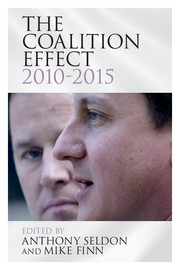Book contents
- Frontmatter
- Contents
- Contributors
- Acknowledgements
- David Cameron as Prime Minister, 2010–2015: The verdict of history
- Part I The coalition and the government of Britain
- 1 The coming of the coalition and the Coalition Agreement
- 2 The coalition and the constitution
- 3 The coalition beyond Westminster
- 4 The coalition and the executive
- 5 The coalition and Parliament
- Part II The coalition and policy
- Part III The coalition and political culture
- Part IV Conclusion
- Index
3 - The coalition beyond Westminster
Published online by Cambridge University Press: 05 April 2015
- Frontmatter
- Contents
- Contributors
- Acknowledgements
- David Cameron as Prime Minister, 2010–2015: The verdict of history
- Part I The coalition and the government of Britain
- 1 The coming of the coalition and the Coalition Agreement
- 2 The coalition and the constitution
- 3 The coalition beyond Westminster
- 4 The coalition and the executive
- 5 The coalition and Parliament
- Part II The coalition and policy
- Part III The coalition and political culture
- Part IV Conclusion
- Index
Summary
Coalition politics, while new, novel and unique in the village of Westminster in 2010, were already well-established governing forms, and are actually ‘par for the course’ and the anticipated governmental outcome post-election in Northern Ireland, Scotland and Wales. In each of these countries, post-devolution constitutional rules and electoral procedures all contained within them provision for a more proportional legislature. Despite coalition politics being the anticipated ‘normal’ politics in the Celtic periphery, the irony is that for the bulk of the 2010–15 period, both Scotland (SNP) and Wales (Labour) were governed by single parties.
Beyond Westminster, the prospect of minority government did not raise the same alarm that it did in London. The assertion that coalition was a necessity due to the UK's urgent economic crisis associated with spiralling public sector debt appeared rather manufactured. In 2010, Scotland had already experienced three years of stable minority government under the SNP. In Wales Labour governed as a minority during 1999–2000 and 2005–7. The Conservatives were only 21 seats short of a majority in the 650-member House of Commons; the SNP had been governing Scotland 18 seats short of a majority in a much smaller 129-member chamber. The notion of minority government being unstable was more a judgement of the internal politics of the Conservative Party, and reflected the biases of the Westminster political class.
An immediate effect of the Coalition Agreement was that the five-year fixed-term parliament ensured that the general election of 2015 would coincide with the scheduled devolved 2015 elections. Faced with the prospect of UK and devolved parliamentary elections taking place simultaneously it was agreed that the elections beyond Westminster be postponed until 2016.
The UK Government coalition effect, in terms of policy impact, was less tangible in Northern Ireland, Scotland and Wales: principally because devolution contained, as part of its design, an umbrella sheltering each territory from some parts of UK Government policy agenda they did not want to pursue.
- Type
- Chapter
- Information
- The Coalition Effect, 2010–2015 , pp. 87 - 112Publisher: Cambridge University PressPrint publication year: 2015



